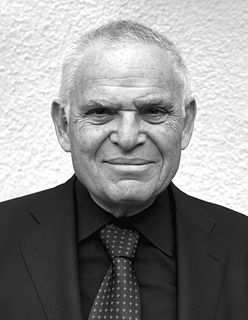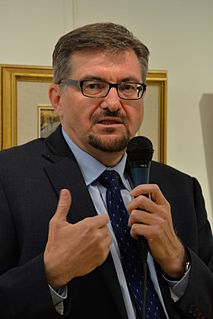
Michael Scott Neiberg is an American historian, who specializes in 20th-century military history.

Michael Scott Neiberg is an American historian, who specializes in 20th-century military history.
Neiberg serves as the inaugural Chair of War Studies in the Department of National Security and Strategy at the United States Army War College. [1] He is also a senior fellow in the Center for the Study of America and the West at the Foreign Policy Research Institute. [2]

World War II or the Second World War, often abbreviated as WWII or WW2, was a global war that lasted from 1939 to 1945. It involved the vast majority of the world's countries—including all of the great powers—forming two opposing military alliances: the Allies and the Axis powers. In a total war directly involving more than 100 million personnel from more than 30 countries, the major participants threw their entire economic, industrial, and scientific capabilities behind the war effort, blurring the distinction between civilian and military resources. Aircraft played a major role in the conflict, enabling the strategic bombing of population centres and the only two uses of nuclear weapons in war. World War II was by far the deadliest conflict in human history; it resulted in 70 to 85 million fatalities, a majority being civilians. Tens of millions of people died due to genocides, starvation, massacres, and disease. In the wake of the Axis defeat, Germany and Japan were occupied, and war crimes tribunals were conducted against German and Japanese leaders.

Edward Nicolae Luttwak is an American military strategist and author known for his works on grand strategy, geoeconomics, military history, and international relations. He is best known for being the author of Coup d'État: A Practical Handbook. His book Strategy: The Logic of War and Peace, also published in Chinese, Russian and nine other languages, is widely used at war colleges around the world.
Walter Ze'ev Laqueur was a German-born American historian, journalist and political commentator. He was an influential scholar on the subjects of terrorism and political violence.
John King Fairbank was an American historian of China and United States–China relations. He taught at Harvard University from 1936 until his retirement in 1977. He is credited with building the field of China studies in the United States after World War II with his organizational ability, his mentorship of students, support of fellow scholars, and formulation of basic concepts to be tested.

Albert Otto Hirschman was an economist and the author of several books on political economy and political ideology. His first major contribution was in the area of development economics. Here he emphasized the need for unbalanced growth. He argued that disequilibria should be encouraged to stimulate growth and help mobilize resources, because developing countries are short of decision-making skills. Key to this was encouraging industries with many linkages to other firms.
Michael Mandelbaum is the Christian A. Herter professor and director of the American Foreign Policy program at the Johns Hopkins University, School of Advanced International Studies. He has written 10 books on American foreign policy and edited 12 more. He most recently authored Mission Failure: America and the World in the Post-Cold War Era.
Jeremy Black is a British historian, writer, and former professor of history at the University of Exeter. He is a senior fellow at the Center for the Study of America and the West at the Foreign Policy Research Institute in Philadelphia, US.

Odd Arne Westad FBA is a Norwegian historian specializing in the Cold War and contemporary East Asian history. He is the Elihu Professor of History and Global Affairs at Yale University, where he teaches in the Yale History Department and in the Jackson Institute of Global Affairs. Previously, Westad held the S.T. Lee Chair of US-Asia Relations at Harvard University, teaching in the John F. Kennedy School of Government. Westad has also taught at the London School of Economics, where he served as director of LSE IDEAS. In the spring semester 2019 Westad was Boeing Company Chair in International Relations at Schwarzman College, Tsinghua University.
Colin S. Gray was a British-American writer on geopolitics and professor of International Relations and Strategic Studies at the University of Reading, where he was the director of the Centre for Strategic Studies. In addition, he was a Senior Associate to the National Institute for Public Policy.
A right-wing dictatorship is an authoritarian regime following right-wing policies. Right-wing dictatorships are typically characterized by appeals to traditionalism, the protection of law and order and the advocacy of nationalism, and justify their rise to power based on a need to uphold a "conservative status quo", often in opposition to communism. Some examples of right-wing dictatorships include the Estado Novo, the Spanish State and the First Republic of Korea, as well as a number of military dictatorships that ruled various Latin American countries during the Cold War.

Serhii Plokhy, or Plokhii is the Mykhailo Hrushevsky professor of Ukrainian history at Harvard University, where he also serves as the director of the Harvard Ukrainian Research Institute.
Jussi M. Hanhimäki is a Finnish historian, specializing in the history of the Cold War, American foreign policy, transatlantic relations, international organizations and refugees.

Marilyn B. Young was a historian of American foreign relations and professor of history at New York University.
This is a bibliographyof works on World War II.

In German military history, Bandenbekämpfung, also Nazi security warfare, refers to the concept and military doctrine of countering resistance or insurrection in the rear area during wartime through extreme brutality. The doctrine provided a rationale for disregarding the established laws of war and for targeting of any number of groups, from armed guerrillas to the civilian population, as "bandits" or "members of gangs". As applied by the German Empire and later by Nazi Germany, it became instrumental in the mass crimes against humanity committed by the two regimes, including the Herero and Namaqua genocide and the Holocaust.

This is a select bibliography of English language books and journal articles about the Post-Stalinist era of Soviet history. A brief selection of English translations of primary sources is included. The sections "General Surveys" and "Biographies" contain books; other sections contain both books and journal articles. Book entries have references to journal articles and reviews about them when helpful.
This is a select bibliography of post World War II English language books and journal articles about the Russia during the First World War, the period leading up to the war, and the immediate aftermath. For works on the Russian Revolution, please see Bibliography of the Russian Revolution and Civil War. Book entries may have references to reviews published in English language academic journals or major newspapers when these could be considered helpful.
This is a select bibliography of English language books and journal articles about the Soviet Union during the Second World War, the period leading up to the war, and the immedidate aftermath. For works on the Stalinism and the Soviet Union, please see Bibliography of Stalinism and the Soviet Union. Book entries may have references to reviews published in English language academic journals or major newspapers when these could be considered helpful.

The bibliography of Niall Ferguson, a Scottish historian based in the United States who is the Milbank Family Senior Fellow at the Hoover Institution at Stanford University and a Senior Faculty Fellow at the Belfer Center for Science and International Affairs at Harvard University. Previously, he was a professor at Harvard, the London School of Economics and New York University, a visiting professor at the UK New College of the Humanities, and a senior research fellow at Jesus College, Oxford, England.